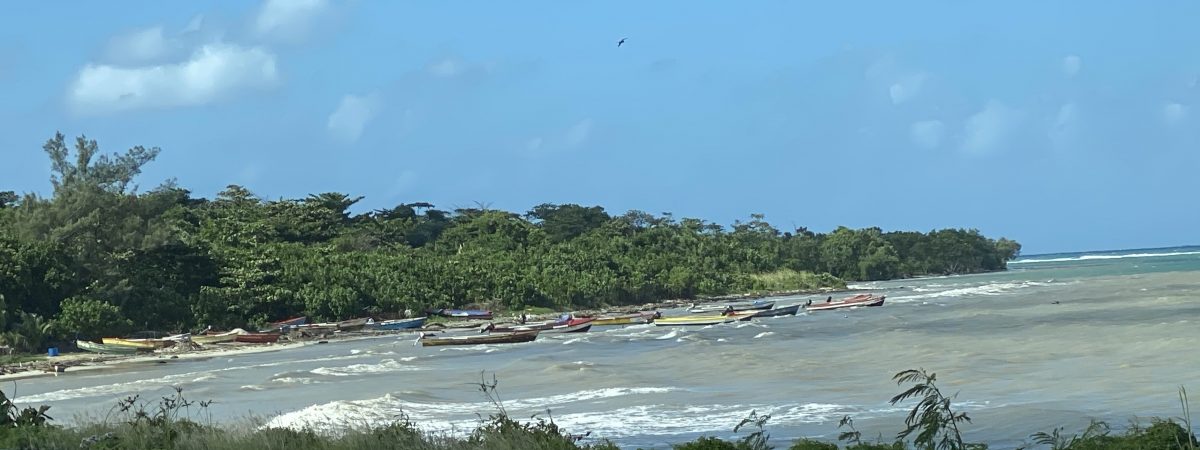The World Cup finals will kick off in Brazil on June 12, with Brazil vs Croatia, as the first match. The matches will culminate on July 13. (Full details of the schedule are on FIFA’s site.) Jamaica did not qualify for these finals. I have no idea how many Jamaicans or which will be headed there. I hope to be in Rio, so at least one of us will be representing. My wife became a lover of things Luso-Brazilian after making two business trips several months ago, so jumped on the wagon and booked flights and arranged accommodation. I’m trying to get myself keyed up for the trip for things that I want to do. Over the past two weeks, I’ve made contact with some Brazilians at my daughter’s school, funnily, all women. I know a few Brazilian men and will be tapping them soon. By chance, the women were all together yesterday morning, and we had a nice little chat about Brazil and some things that excited me about visiting there. I learned a few Portuguese words. The women keep telling me that Brazilian food is the best. But, they warn me about crime. Living in Kingston, I wonder what could be in store. I promised them that I would try as much of the food as I could, and that I would try to be careful, but life is full of risks. I’ve visited a few crime-ridden spots over the years and I know that you may get lucky and not be robbed or attacked, but it’s important to take the simple precautions, such as no jewellery and being careful with the new gadgets, such as cell phones.
Jamaica did not qualify for these finals. I have no idea how many Jamaicans or which will be headed there. I hope to be in Rio, so at least one of us will be representing. My wife became a lover of things Luso-Brazilian after making two business trips several months ago, so jumped on the wagon and booked flights and arranged accommodation. I’m trying to get myself keyed up for the trip for things that I want to do. Over the past two weeks, I’ve made contact with some Brazilians at my daughter’s school, funnily, all women. I know a few Brazilian men and will be tapping them soon. By chance, the women were all together yesterday morning, and we had a nice little chat about Brazil and some things that excited me about visiting there. I learned a few Portuguese words. The women keep telling me that Brazilian food is the best. But, they warn me about crime. Living in Kingston, I wonder what could be in store. I promised them that I would try as much of the food as I could, and that I would try to be careful, but life is full of risks. I’ve visited a few crime-ridden spots over the years and I know that you may get lucky and not be robbed or attacked, but it’s important to take the simple precautions, such as no jewellery and being careful with the new gadgets, such as cell phones.
I have started to focus on the football side of the World Cup over the past few days, once the team selections started to emerge. The competition is open, and I am looking at how various nations get their support. I feel that a lot of Jamaicans pull for Brazil, largely because of their flamboyant style over the years, but also because they have produced a long stream of great black players, most notably, Pele. I’ve always pulled for Brazil, with the 1970 tournament standing in my mind as the best I have seen. Pele’s headed goal for 1-0, Brazil’s 100th in the tournament is a classic of power and control. Carlos Alberto’s goal for 4-1 was one of the best set-ups ever. Brazil!
But I know that I will also feel a pull for the England team, having made my football career there and having supported an English team all my life. Now, the English interest is different, with a few black players with Jamaican roots being an important part of the team. I will also want to see how the African teams do, and hope that Ghana will hold its nerves this time and really make the world stand up. The South Americans in South America are always good value: Argentina will always want to topple Brazil in Brazil; Uruguay are no longer a surprise, and Luis Suarez is an amazing player to watch. The Europeans? Spain still have the best-looking chance at the start, but I hope England will give a good account of themselves.
As the finals come closer, the international media is paying a lot more attention to a long-running problem–the pace and nature of the stadium developments. Some are set to be still unfinished when the games start, and that is happening amid stories of bribery and incidents and building accidents that suggest things were being done too fast and without enough care. That’s a real disgrace. Attention is also being focused on domestic opposition to the World Cup being given to Brazil. In short, a lot of money being spent on stadiums when people are in desperate need of housing and social services seems at least problematic. Those in need seem likely to gain little from the tournament or after it. Concerns are real that demonstrations could disrupt matches.
A new survey by the Pew Research Center finds that 72% of Brazilians are dissatisfied with the way things are going in their country, up from 55% just weeks before the demonstrations began in June 2013. About 61 percent think hosting the event is a bad thing for Brazil because it takes money away from schools, health care and other public services—a common theme in the protests that have swept the country since June 2013. Only 34 percent think the World Cup, which Brazil will host for the first time since 1950 and which could attract more than 3.5 million people to the nation’s twelve host cities, will create more jobs and help the economy.
Reuters reported a few days ago that Anonymous hackers plan a mass hack attack on the Cup’s sponsors. In the age of mass terrorism, it’s not a set of idle threats.
In the age of mass terrorism, it’s not a set of idle threats.
I have also been thinking about many things to do with the World Cup that are not to do with the football. I am beginning to think about the legacies of slavery on Brazil and Jamaica (or more broadly, the Caribbean). That would be an interesting area to explore. Black people in the English-speaking Americas tend to not draw too close to the shared heritage of the non-English speaking areas. We do not know or ignore the connections, such as the fact that the Portuguese were slave traders, just like the British; Brazil had a larger slave population (3 million) than the United States. Slavery had an immense impact on Brazil’s economy and social structure. Brazil’s slave history shares some aspects with Jamaica’s, such as slave rebellions (in the mid-19th century) and runaway slave communities (‘quilombos’) in the deep interior, similar to our Maroons, as early as the 17th century. I’m npt knowledgeable about this and look forward to trying to learn more about such developments.
On the back of this comes news about the bribery and corruption involved in Qatar winning the bid for the World Cup in 2022. That bid may yet be quashed and a new venue selected. The question had always been ‘Why would Fifa award the World Cup to a small Gulf state with no footballing history, let alone stadia, where summer temperatures can reach 50C (122F)?’ The USA, Australia and Japan had seen their bids snuffed. England, too, in its bid for the 2018 finals, which were given to Russia. With that latter country causing ruffles over its human rights record and the annexation of Crimea, both bids could be reopened.
Other distasteful stories are coming out, such as Pele’s son, Edinho, who had also been a professional footballer (goalkeeper) for the Santos club, being sentenced this week to jail for 33 years in a money laundering case, helping a drugs cartel in Santos.
Cultural interests are many. I am also intrigued by the influence of Asians on Brazil’s economy and society. While Jamaica had its Chinese influence from the mid-19th century, Brazil has its influx of Japanese from the early 20th century. Brazil is home to the largest Japanese population outside of Japan: as of 2000 between 1.4 and 1.5 million people of Japanese descent lived in Brazil. The overall Japanese-Brazilian population is declining, with a decreased birth rate and an aging population; return immigration to Japan as well as intermarriage with other races and dilution of ethnic identity is also going on. Of the five Brazilian women I met recently, two are of Japanese origin; the grandmother speaks Japanese, but the daughter does not; they both speak excellent English. I don’t know if that will be true of any I meet in Brazil.
I did some quick online research last night about this community. In 1907, the Brazilian and the Japanese governments signed a treaty permitting Japanese migration to Brazil, many of them became owners of coffee plantations, replacing Italians who were being pressured to cease subsidized migration. Japanese immigrants began arriving in Brazil in 1908, as a result of the decrease in the Italian immigration to Brazil and a new labour shortage on the coffee plantations. In the first seven years, 3,434 more Japanese families (14,983 people) arrived. The beginning of World War I in 1914 started a boom in Japanese migration to Brazil, and inflows peaked into the mid-1930s. A brief reading indicates that assimilation was often forced and the Japanese immigrants faced significant prejudice in a country that still had a slave owner mentality to foreign labour.
The Japanese Brazilian community was strongly marked by restrictive measures when Brazil declared war against Japan in August 1942. During the National Constituent Assembly of 1946, the government proposed Amendments to the Constitution as follows: “It is prohibited the entry of Japanese immigrants of any age and any origin in the country”. In the final vote, a tie with 99 votes each in favor and against. Senator Fernando de Melo Viana, who chaired the session of the Constituent Assembly, had the casting vote and rejected the constitutional amendment. By only one vote, the immigration of Japanese people to Brazil was not prohibited by the Brazilian Constitution of 1946.
Japanese immigrants appeared to the Brazilian government as undesirable and these immigrants were seen as non-assimilable. As Asians, they did not contribute to the “whitening” process of the Brazilian people as desired by the ruling Brazilian elite. In this process of forced assimilation, the Japanese, more than any other immigrant group, suffered the ethno-cultural persecution imposed during this period.
Nowadays, many Japanese Brazilians belong to the third generation (sansei), who make up 41 percent of the community. First generation (issei) are about 12.5 percent, second generation (nisei) are 31 percent, and fourth generation (yonsei) 13 percent. A more recent phenomenon in Brazil is intermarriages between Japanese Brazilians and non-ethnic Japanese. Japanese-Brazilians live mainly in Sao Paulo.
I will be watching how the Japanese team reach out to this community, and also if there is much reaching back to them from their Brazilian ‘near compatriots. Brazil and Japan have forged some football links at playing and coaching level, with ‘Zico’ (a famous player turned coach)

coaching the Japanese national team from 2002, up through the 2006 World Cup. He had previously played and coached in Japan.

Many things are starting to percolate in my head about the trip and what I want to look for and experience in Brazil.
This wont be my first World Cup finals; I was in Mexico in 1986, and went to the Argentina-Germany final, sitting in the palco behind the goal with a clear view of all the goals. I’d bought tickets from a tout on the morning of the final for a really good price. I went with an English acquaintance I had met in the city. I had been in Latin America on a business trip. My boss was a football fan. He had made his connections with Mexican bankers, who had helped finance the tournament, so was set up in a VIP box for the final. I hung out with some Mexican friends and watched matches on TV, eating chicherones and drinking a lot of beer and tequila.

I also went to Venezuela and Colombia during that tournament and saw how fervent South American fans could be. I recall a lunch-meeting with a central bank governor in Caracas, and how after eating, we all relaxed and screamed as we watch a World Cup match live on a TV in the restaurant: my kind of business lunch. I remember the city being absolutely dead.
Of course, I will spend a little time thinking about how the two countries’ leaders, both women, stack up against each other.
I will also reminisce about how our football got a major boost from a Brazilian coach, René Rodrigues Simões, who coached the Jamaica national team between 1994-2000 and took them to the 1998 World Cup. Jamaica has since gone through a Jamaican national coach, and a disastrous World Cup campaign. Now, we have gone to Germany to find a solution.
It’s going to be exciting, and I will keep delving into topics that have resonance for both Jamaica and Brazil.

I am not sure where you are getting your info, but good topic.
I needs to spend some time learning more or understanding more.
Thanks for great info I was looking for this info for my
mission.
LikeLike
Hi there, I enjoy reading tɦrough your article post.
Ilike tо write а little comment to support үօu.
LikeLike
Ѵery descriptive post, Ι likeɗ that а lot. Willl tɦere be a part 2?
LikeLike
Thanks νery nice blog!
LikeLike